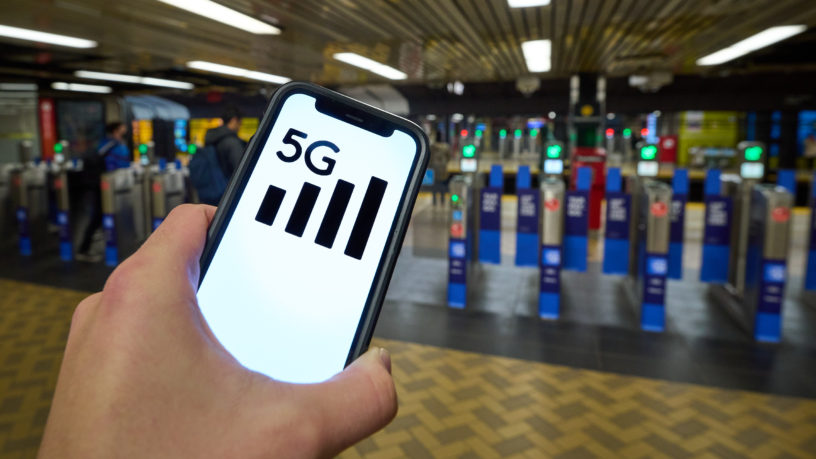By Karina Leung
Rogers Communications Inc. and Bell Canada cell phone providers have partnered with the Toronto Transit Commission (TTC) to give customers 5G network access on the subway at select stations.
This will allow people to make calls, texts and cellular data while in the stations and in some tunnels. According to the TTC’s website, stations on Line 1 in downtown Toronto and 13 stations between Keele and Castle Frank stations on Line 2 will now have service.
Freedom Mobile has already been giving their customers access to the internet. The service provider gives access to service on all TTC subway stations and in the tunnels between Wilson station and Vaughan Metropolitan Centre, Bloor-Yonge, St. George and Bay stations, according to its website.
The TTC’s subway system was one of the few places left in Toronto without this service. With many Toronto Metropolitan University (TMU) students commuting to campus everyday, this change could be seen either as a benefit or a drawback.
“It does make me feel a lot safer, especially on the TTC”
For years, TTC subway riders were forced to put down their phones, read the advertisements, listen to downloaded music or talk to friends.
For first-year creative industries student Meyling Martinez, this change is great news, providing a sense of safety and ability to share her location while riding the subway.
“It does make me feel a lot safer, especially on the TTC. Lately, there’s always different kinds of people there that might make it not the safest place,” she said.
Martinez commutes to her 8 a.m. classes three times a week. She added that going on the TTC at night as a woman makes it much harder to feel safe.
James L. Turk, director at TMU’s Centre for Free Expression, understands this.
“If there’s a breakdown on the train and you can’t get a meeting [or you have an appointment], you can phone and explain what’s happened,” he said.
Turk said there safety factors that come with being connected. If commuters face any kind of security issue or policing related problem they can call 911. “So it has a lot of those kinds of immediate advantages,” he explained.
“If there’s a breakdown on the train and you can’t get a meeting [or you have an appointment], you can phone and explain what’s happened”
Alexander Ferworn, a professor in the department of computer science at TMU and an expert on safety, said the TTC should have been providing a basic service of communication.
“There’s public transit systems all over the world that have this facility and it seems like everything is delayed when you’re talking about Toronto,” he said.
“How are you supposed to actually tell anybody that something is happening if there’s no means of communication,” Ferworn added.
He said he knows the province has been pushing the TTC to do this for some time now.
“They had a semi-solution for it where they provided free Wi-Fi at certain terminals. or certain stations, but not actual full 5G service,” he said.
Salma Koubaa, a first-year undeclared arts student at TMU, spends two hours of each day commuting. She said she was actually fine with not having service on the subway.
“I would just waste my time…going on social media instead of using that time to study and work on my readings,” she said.
“Knowing myself, I wouldn’t use that time effectively if I had access to internet,” Koubaa added.
Turk said just because everyone has access to this now doesn’t mean they have to use it.
“Being addicted to our phones is not a problem with it being on the TTC. It’s a problem of us not having developed the discipline to be able to turn it off,” he said. “That is a huge social problem that we have to deal with as a society, but I don’t think the solution is to deny people the ability to be connected when they need to on transit.”
“Knowing myself, I wouldn’t use that time effectively if I had access to internet”
“The real solution is to develop the discipline to turn it off so you can be disconnected,” Turk added.
Karina Lotay is a first-year business management student at TMU who said she prefers the new connection to the internet for safety reasons.
“I’m actually surprised that we didn’t have this before, but especially because of all the recent recordings of violence on the TTC, it makes me feel a lot safer to be able to have access to data and internet on the subway,” she said.
Turk agrees. “There’s subway systems elsewhere in the world that have done this long since. And given the number of hours that many people ride the TTC every day, it’s long overdue,” he said.
Turk doesn’t see any cons to this implementation.
“[Students] can remain connected in whatever way whether it’s reading things or talking with friends or whatever. It’s a service that had been really denied to people who are transit users,”
Ferworn said although he is glad the TTC has finally invested in the safety of subway riders, it will only be effective in certain circumstances.
“The real solution is to develop the discipline to turn it off so you can be disconnected”
“Most of the problems are caused by the humans, not by their equipment,” he said.
But Ferworn believes the TTC is heading in the right direction when it comes to increasing safety.
“Certainly this is a great step forward,” he said.
With files from Gabriela Silva Ponte.










Leave a Reply